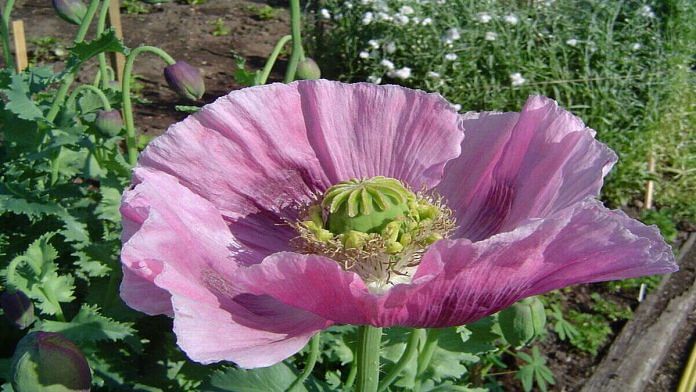New Delhi: A year since the Taliban takeover, opium cultivation in Afghanistan has increased by 32 per cent, found a new report by the United Nations Office on Drugs and Crime (UNODC).
Around 233,000 hectares of land were used for opium cultivation after the August 2021 takeover. It also meant this 2022 opium crop was the third-highest area under cultivation “since the beginning of systemic monitoring” in Afghanistan starting 1994, the report said. About 56,000 hectares of more land were used for cultivation of opium the previous year, added the report.
“Opium prices have soared following the announcement of the cultivation ban in April 2022,” it noted.
While illegal opium trade has been booming in Afghanistan, despite the Taliban’s ban on it, synthetic drugs such as heroin and crystal meth are also being exported from the country. According to reports, the availability of a shrub called Ephedra has allowed for the production of meth and heroin across Afghanistan.
Also read: How John F Kennedy covered up a ‘quid-pro-quo’ deal with USSR that ended Cuban Missile Crisis
Farmers’ income triple from opium sales
The UNODC report also found that farmers’ income from opium sales have tripled to $1.4 billion in 2022 from $425 million in 2021. This has been the most profitable poppy cultivation for Afghan farmers since 2017. The surge in income accounted for nearly 29 per cent of Afghanistan agriculture sector’s value in 2021.
However, the total revenue generated from the sale of opium far exceeds $1.4 billion because “larger sums are further accrued along the illicit drug supply chain outside the country”, the report added.
Afghanistan accounts for 80 per cent of the poppy plant produce globally.
“Most of the 2023 opium crop must be sowed by early November; farmers will take decisions on whether and how much opium poppy to plant amid severe economic disruption and humanitarian crisis, continued high prices for opium and uncertainty about how the de facto authorities will enforce the cultivation ban,” the UNODC report said.
Opium cultivation in South-West Afghanistan
The report also said that around 73 per cent of Afghan opium is cultivated in the country’s South-West region. Especially in places such as Hilmand, where 122,045 hectares of opium is cultivated annually.
In Kandahar, opium is grown on 29,229 hectares of land, Nimroz had 2,429 hectares for poppy to grow, while 14,557 and 1,531 hectares were cultivated in Uruzgan and Zabul respectively, the report added.
Western Afghanistan accounted for 14 per cent of overall poppy cultivation, with Baghdis, Farah, Ghor, and Hirat as the predominant provinces.
Afghanistan’s economy has contracted after the Taliban takeover, with figures suggesting a contraction of $5 billion or 21 per cent since 2020. Annual per capita income has also declined by 14-28 per cent in this period.
However, the illicit economy has continued to thrive, with the opium trade forming a central part of this economy, the report added.
Also read: How brutal Chinese assault across Namka Chu drove Indian forces back as 1962 war broke out



